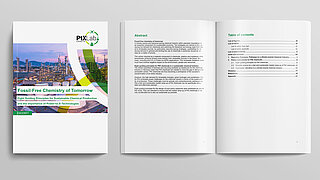Climate-neutral basic materials made by PtX for the chemicals industry
The chemicals industry needs to overcome major challenges to reach its climate goals. In this sector, switching to Power-to-X technologies and green hydrogen offers huge potential to cut emissions. PtX Lab Lausitz will offer its services as a think and do tank for this transition.
According to the provisions of the Federal Climate Change Act (“Bundes-Klimaschutzgesetz”), the industrials sector in Germany must cut around two-thirds of its greenhouse gas emissions (baseline: 1990) by 2030. The target year for greenhouse gas neutrality is 2045. As the third-largest segment in this sector, the chemicals industry faces a number of hurdles here. One of the most significant is the fact that chemical products are often based on hydrocarbons. Roughly seven percent of national greenhouse gas emissions are created by producing these materials. At the same time, the chemicals industry plays a key role in climate change mitigation by developing innovative new materials and products that help to reduce greenhouse gases and save energy in many different areas.
Energy efficiency is only part of the solution
Over the last few years, the chemicals industry has already cut emissions by improving energy efficiency. Much greater effort is required to become greenhouse gas-neutral, however. Production processes must be electrified, closed carbon cycles should be introduced and raw materials need to be renewable rather than fossil. According to a roadmap published by the German Chemicals Industry Association (VCI) in 2019, this will require considerable investment in new technologies and equipment.
Since raw material extraction generates a large percentage of overall emissions, the basic chemicals segment offers the greatest potential for reducing greenhouse gases. Cross-sectoral solutions will be required in order to achieve this. These include the use of green hydrogen and its derivatives – such as synthetic basic materials based on Power-to-Chemicals (PtChem) technologies, for example. These technologies can significantly reduce both the direct and indirect CO2 emissions of many types of products.
Green hydrogen as an alternative
A large part of chemical manufacturing involves the use of basic chemicals such as ammonia, methanol, ethylene and propylene, whose production always involves high CO2 emissions. In the case of ammonia and methanol, hydrogen is already part of the process but is still obtained with the use of fossil energy. In the case of ethylene and propylene, these are obtained by the thermal cracking of hydrocarbons as part of refining crude and liquefied gas. Both of these processes involve sizeable CO2 emissions.
Green hydrogen offers an alternative here: the fossil hydrogen used to synthesise ammonia and methanol can be substituted directly with green hydrogen. This methanol, now produced as part of a climate-neutral process, can then be used in the methanol-to-olefins (MTO) process to make ethylene and propylene.
In this way, the use of green PtX technologies can secure the supply of the required basic materials to the chemicals industry while making an important contribution to the reduction of CO2 emissions. One precondition to achieving this, however, is that green hydrogen is available in sufficient quantities and at a competitive price.
PtX Lab Lausitz as a think and do tank
PtX Lab will be working to ensure the availability of climate-neutral basic chemicals together with their certification according to strict, internationally recognised sustainability standards, as well as creating incentives for stimulating demand at a national and European level. As a think and do tank, it will provide consulting services to industry, local government and other stakeholders for all issues relating to synthetic fuels and basic materials.
Fossil-Free Chemistry of Tomorrow — Eight Guiding Principles ...
PtX Lab Study | 03/2025 I Topic: Sustainable Chemistry I 34 Pages

Green Hydrogen Derivatives — Recommendations
PtX Lab Briefing | 01/2025 I Topic: Sustainable Chemistry I 14 Pages
Power-to-X (PtX) in NetZero scenarios in the chemical industry
PtX Lab Facts | 06/2024 I Topic: Sustainable Chemistry I 4 Pages
Feedstock mix for sustainable chemistry
PtX Lab Facts | 04/2024 I Topic: Sustainable Chemistry I 3 Pages



